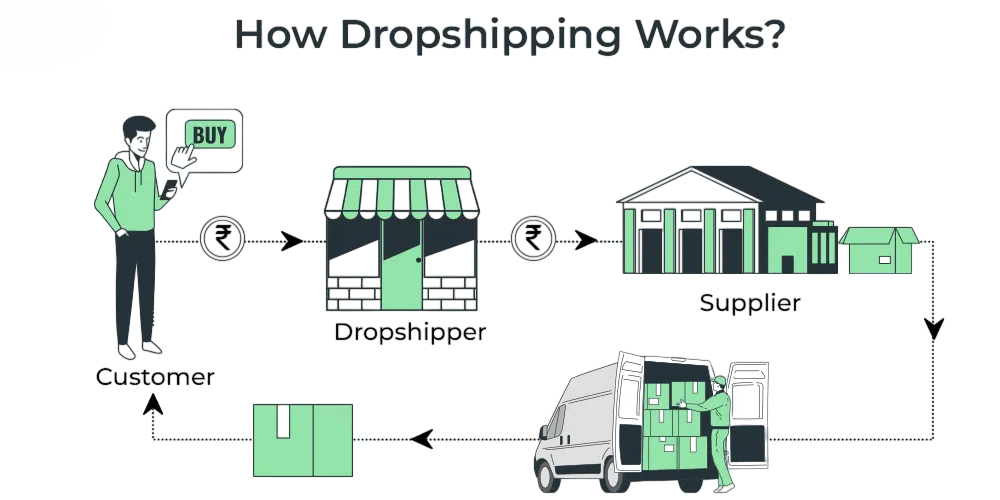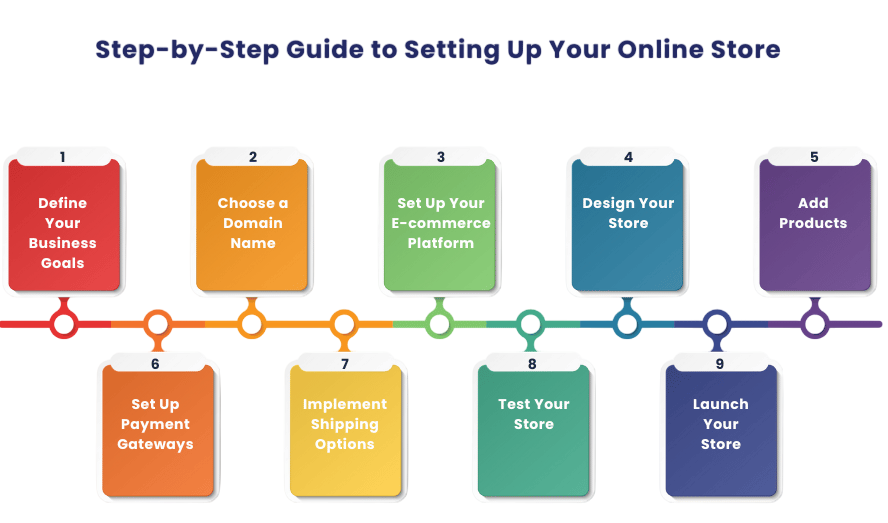
- The Rise of E-commerce
- What Is Dropshipping?
- How Dropshipping Works
- Benefits of Dropshipping
- Challenges and Risks of Dropshipping
- What You Need to Start a Dropshipping Business
- Choosing a Niche and Products
- Setting Up Your Online Store
- Marketing Your Dropshipping Store
- Managing Orders and Customer Service
- Final Thoughts
The Rise of E-commerce
This guide gives a complete overview of dropshipping. It explains how the dropshipping business model works. It looks at the advantages and disadvantages of starting a dropshipping business. It also provides the information needed to decide if dropshipping fits your entrepreneurial goals. To build the skills needed for launching and scaling such ventures, explore Digital Marketing Training a practical course that covers SEO, paid ads, content strategy, and analytics to help you attract customers and grow your online business effectively. This guide serves as a starting point for anyone interested in launching a dropshipping business. It will cover how to choose a niche market and find reliable suppliers. The guide will also show how to set up an online store and promote the products. Additionally, it includes strategies for customer service and growing the business. By offering a solid understanding of the basics, this guide aims to equip aspiring entrepreneurs with the knowledge needed to start their own dropshipping business and succeed in e-commerce.
Ready to Get Certified in Digital Marketing? Explore the Program Now Digital Marketing Online Training Offered By ACTE Right Now!
What Is Dropshipping?
Dropshipping is an online retailer system where you sell products to customers without keeping the products being sold in your inventory. When customers buy products in your online store, you purchase the items sold by a third party, usually a wholesaler or manufacturer. The third party sends this product to the destination, usually the customer. This implies that you place yourself between the supplier and the customers. To succeed in this intermediary role, you need visibility, trust, and conversion tactics. Explore Digital Marketing Strategy a practical guide that teaches how to position your brand, attract the right audience, and optimize every stage of the customer journey for sustainable growth. While you operate the website, market the items, and always take care of the clients, the supplier stores the stock and sends them to the buyer. It would help if you did not track your inventories or handle the shipment. Therefore, dropshipping is a method of launching an online business without buying goods in advance and storing them. One of the biggest benefits of dropshipping is evident in the startup cost. Since you are not purchasing the stock beforehand, there is not a lot of capital needed to start a store. You can launch your online store and begin trading in products even before you pay any deposits on your goods.
How Dropshipping Works
Here’s how the dropshipping process works step-by-step:
- Customer Places Order: A visitor buys a product from your online store.
- You Notify the Supplier: You forward the order details to your dropshipping supplier.
- Supplier Ships the Product: The supplier packages and ships the product directly to the customer.
- You Keep the Profit: You charge the customer a retail price and pay the supplier the wholesale price, keeping the difference as profit.
- Low Startup Costs: No need to invest in inventory or warehousing.
- Easy to Start: You can launch a store in a few days using platforms like Shopify or WooCommerce.
- Location Independence: You can run your business from anywhere with an internet connection.
- Wide Product Selection: You can offer hundreds or thousands of products without managing stock.
- Scalable: You can easily scale by adding new products or marketing channels.
- Low Profit Margins: Due to competition and supplier costs.
- Inventory Issues: You rely on suppliers’ stock levels, which can change unexpectedly.
- Shipping Complexities: Longer shipping times, especially when using overseas suppliers.
- Quality Control: You can’t inspect the products before they reach the customer.
- Customer Service Issues: Handling returns and complaints can be difficult when you’re not managing the products.
- Passion or Interest: Are you excited about the product category?
- Profitability: Does the product offer healthy margins?
- Low Competition: Avoid oversaturated markets.
- Problem-Solving: Products that solve a pain point tend to sell well.
- Size & Weight: Small, light items are cheaper to ship.
- Health & Wellness
- Home Decor
- Pet Products
- Eco-Friendly Items
- Tech Accessories
- Choose a platform (Shopify, WooCommerce, Wix)
- Register a domain
- Design your store
- Add product descriptions and photos
- Set up payment gateways
- Configure shipping settings
- Test everything before launching
- Social Media Marketing: Facebook, Instagram, TikTok
- Influencer Marketing: Partner with micro-influencers
- Content Marketing: Blog posts, videos, tutorials
- Email Marketing: Build an email list with offers and newsletters
- Paid Ads: Google Ads, Facebook Ads
- Set clear shipping times on product pages
- Respond to customer inquiries quickly
- Offer hassle-free returns when possible
- Track all shipments and send updates

To Explore Digital Marketing in Depth, Check Out Our Comprehensive Digital Marketing Online Training To Gain Insights From Our Experts!
Benefits of Dropshipping
Dropshipping has become popular for a reason it lowers the barrier to entry for aspiring entrepreneurs. But success in this model depends heavily on how well you attract, convert, and retain customers online. To build those capabilities, explore Digital Marketing Training a hands-on course that teaches SEO, paid advertising, content strategy, and analytics to help you grow and sustain a profitable ecommerce business.
Challenges and Risks of Dropshipping
While dropshipping has its advantages, it also comes with challenges: unpredictable traffic, conversion bottlenecks, and limited customer insights. To overcome these hurdles and make data-driven decisions, explore Learn Google Analytics a practical guide that helps you track user behavior, measure campaign performance, and optimize your ecommerce strategy with precision.
Looking to Digital Marketing Training? Discover the Digital Marketing Expert Masters Program Training Course Available at ACTE Now!
What You Need to Start a Dropshipping Business
There are several key steps and resources to launch an online store. Start by finding the area you want to focus on or find a product that is in high demand in a particular market. A niche will help you find your target audience and reduce competition, while sales will show that there is a demand for your product. Then choose an e-commerce platform. Some are better suited for specific industries and development stages. Examples include Shopify, WooCommerce, and BigCommerce, each with different features, price options, and the ability to customize to suit your business requirements. Therefore, you need to compare to find the best option. To amplify your store’s reach and drive conversions, explore Digital Marketing Campaigns a strategic guide that helps you plan, execute, and optimize targeted promotions across search, social, and email channels. In order for an online store to look decent, you also need to have a domain name and branding. The domain name should be easy to spell and remember, ideally in some way connected with your product or niche. Branding includes a logo, color scheme, and thematic approach that will appeal to your potential customers and make your resources stand out from competitors. In terms of inventory and fulfillment, use dropshipping suppliers or apps. Dropshipping is a type of order fulfillment where the seller does not store the goods sold. Instead, the dropshipping supplier is responsible for fulfilling the order.
Choosing a Niche and Products
Choosing the right niche is crucial to your success. Look for: market demand, low competition, and alignment with your interests or expertise. To simplify this process and build a strong foundation, explore Digital Marketing Made Simple a beginner-friendly guide that breaks down essential strategies like audience targeting, content planning, and SEO to help you launch with confidence.
Popular niches include:
Preparing for Digital Marketing Job Interviews? Have a Look at Our Blog on Digital Marketing Interview Questions and Answers To Ace Your Interview!
Setting Up Your Online Store
You’ll need an eCommerce website to showcase your products and process orders.
Steps:

Marketing Your Dropshipping Store
Once your store is live, you need to drive traffic to it. Staying updated with evolving consumer behavior, platform algorithms, and promotional tactics is key to maintaining visibility and engagement. Explore Digital Marketing Trends a forward-looking guide that highlights emerging strategies, tools, and channels to help you attract the right audience and stay ahead in a competitive ecommerce landscape.
Managing Orders and Customer Service
Use automation tools to simplify order fulfillment and notifications. Good customer service is vital for maintaining your reputation. To align these operational touchpoints with strategic growth, explore Digital Marketing Funnel a structured guide that explains how to attract, engage, convert, and retain customers through each stage of the online journey.
Tips:
Final Thoughts
Dropshipping is a compilation opportunity for individuals who desire to try their luck in the field of eCommerce. The idea attracts a small amount of invested initial capital and a special and quite simple setup, and therefore it is a doorway for an entrepreneur to test a business idea, earn passive income or make an unreliable journey to a ready-made brand. Nonetheless, it is not necessary to underestimate it, because no one will bring in a million for a couple in this business. To turn potential into performance, explore Digital Marketing Training a results-driven course that teaches SEO, paid campaigns, content strategy, and analytics to help entrepreneurs build visibility, drive traffic, and scale sustainably. For success, long-term tactics must be defined and scrupulous work performed for a certain period. To begin, it would be best if you determined a business plan, including target audiences, selected niches, and a SWOT analysis on the main competitors. In order to withstand market competition, one should pay attention to the creation of significance for customers. It is essential in constructing a customer-oriented product, which means choosing it based on the needs and preferences of your target consumer segment and presenting it with a detailed description of this plan.. Such a part of the store’s task is customer care and rapid feedback.




